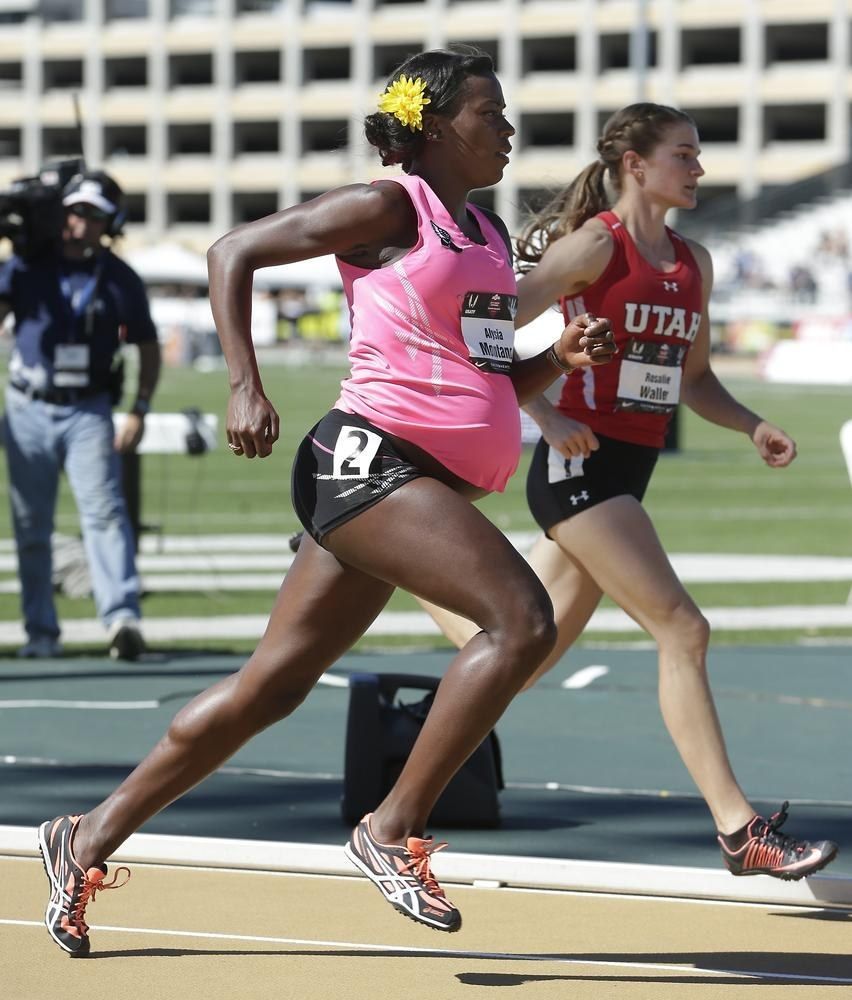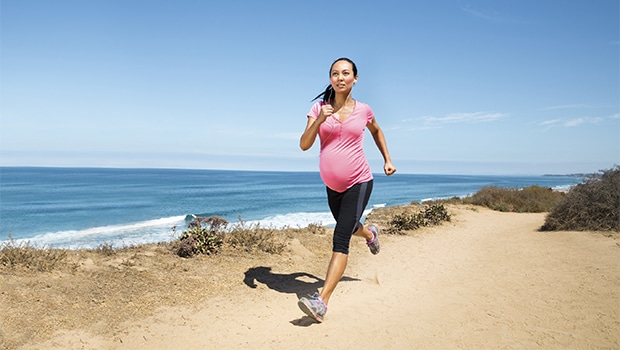Everyone agrees that exercise is good for pregnant women, but should you be running while pregnant?
You may find lots of well-meaning friends and family who think that running may be unsafe if you’re pregnant. But they may not be doctors. According to the American College of Obstetricians and Gynecologists (ACOG), you can continue running during pregnancy if you are an experienced runner. Discuss your activities with your ob-gyn, and if he/she clears you, you’re good to lace up your running shoes and continue running.
Contents
Reasons To Keep Running During Pregnancy
- Women who exercise during pregnancy have improved cardiovascular function, improved body image, and improved psychological health.
- Exercising for about 150 minutes a week may reduce the risk of gestational diabetes, pre-eclampsia (pregnancy-induced high blood pressure), pre-term birth, having a baby with high birth weight, and the need for a cesarean section.

- Exercising during pregnancy may also improve your baby’s brain development.
- Pregnancy workouts can help you improve both your physical and mental health.
- In general, exercise increases your body‘s production of endorphins. These are feel-good hormones that can elevate your mood.
- Exercise or running during pregnancy can relieve anxiety.
- Staying fit and running while pregnant can ease constipation, back pain, and fatigue.

- Running promotes a healthy weight.
- According to Erin Dawson Chalat, M.D., an OB-GYN, “Women who exercise [during pregnancy] have easier, faster labors, they feel better postpartum, and their recovery is much quicker.”
Challenges Of Running While Pregnant
Pregnancy changes your body. It’s inevitable.
You have transitioned from a runner to a pregnant runner. This being the case, do not hold yourself to the same standards as pre-pregnancy. Understand and accept that you will need to adjust your routine. You may need to slow down, add walk breaks, or take extra recovery days as needed. As you get closer to your due date, you might not be able to run as far, as long, or as fast.
Some moms can run throughout their pregnancies, but this may not be the case for you. If you encounter headaches, chest pain, muscle weakness, vaginal bleeding, calf pain, or amniotic fluid leaks, you should stop running and contact your OB-GYN. Also, if there are complications in your pregnancy such as placental problems or pre-eclampsia—running can be risky. If you are having multiples, running might put you at risk for premature labor and therefore should be avoided.
However, if you have an uncomplicated pregnancy, experts like Dr. Dawson says there’s no harm in maintaining your exercise routine – running won’t cause miscarriage or hurt the baby. “The baby is pretty isolated and protected during pregnancy.”
Here are a few challenges you may run into, and how you can solve them.
Balance

As a runner with a growing belly, you may deal with a shift in your center of gravity and balance. This can put you at risk of falling, especially if you’re running on uneven trails. When you are running during pregnancy, try to stick to flat sidewalks or tracks. Avoid mountain trails.
Bouncing
As your tummy gets bigger in your second and third trimester, running will cause your tummy to bounce, which can become uncomfortable. Solve this problem by wearing a belly support band. These can help reduce movement.
Injuries
When you are pregnant, your joints and ligaments become looser because your body produces the hormone relaxin to relax ligaments in your pelvis. This is to prepare your body for childbirth. However, the hormone also relaxes ligaments and joints in other parts of the body, putting you at an increased risk of injury. Loose ligaments can cause pain in your pelvis, sacroiliac joint, or lower back. You may feel extra sore after a run.
To avoid injuries, you will be best advised to start slowly and remain aware of your new limitations. Also, avoid workouts that cause discomfort.
Sweating
When you are pregnant, it is likely that you will start sweating earlier and faster. This being the case, wear loose-fitting clothes and hydrate well.
Staying Cool
As much as you may love getting outdoors and feeling the sun on your skin, you would be best advised to stay indoors on hot or humid days.
This is particularly the case in the first trimester when a high body temperature (above 102 degrees Fahrenheit) may cause neural tube defects. As a runner, don’t be overly concerned about this because according to the ACOG, it’s unlikely that exercise will increase body temperature to a dangerous level. It is, however, important to mention that certain activities like hot yoga, hot tubs, and saunas can increase your body temperature to above 102 degrees Fahrenheit, and therefore should be avoided.
Running During Pregnancy – How To Take Care Of Yourself
-
Stretch Before And After A Run
 You have the hormone relaxin running through your body, so it’s especially important to stretch before and after a run and to always do a light warm-up.
You have the hormone relaxin running through your body, so it’s especially important to stretch before and after a run and to always do a light warm-up.
-
Wear A Belly Support Band
Running while pregnant will result in a bouncing belly, which may cause pain and discomfort for you. If this is you, consider wearing a supporting belly band. They are great at helping to stabilize a growing belly and may reduce pelvic pressure.
-
Run Where There Are Toilets
There is increased pressure on your bladder. Be sure to map out a running route closer to home, or in an area with access to public restrooms.
-
Stay Hydrated
 Don’t try to avoid bathroom breaks by cutting back on fluids. It is important that you remain thoroughly hydrated for the health of you and your growing baby.
Don’t try to avoid bathroom breaks by cutting back on fluids. It is important that you remain thoroughly hydrated for the health of you and your growing baby.
-
Stay Comfortable
According to Erin Dawson Chalat, M.D., an OB-GYN, there’s no need to monitor your heart rate. “If you can talk and feel okay, you can continue.”
-
Wear Loose Fitting Clothes And Comfortable Shoes
You can prevent overheating by wearing loose-fitting clothes.
Also, take a look at your running shoes – they may not fit as well as they used to. It is not uncommon for your feet to grow during pregnancy.
Make sure that your running shoes fit well and support your ankles and arches. This keeps your feet stable and prevents injuries and falls.
-
Wear A Sports-Bra
Your breasts may have grown since the start of your pregnancy. This can make running uncomfortable. Invest in a supportive sports bra to prevent excess bouncing and/or breast pain while running.
-
Eat The Right Foods
 Your body needs extra calories when exercising during pregnancy, so eat easily digestible carbohydrates before running. This could be a snack like toast with nut butter, fruit, etc. However, give yourself enough time to digest the food before you start running – digestion may slow down during pregnancy.
Your body needs extra calories when exercising during pregnancy, so eat easily digestible carbohydrates before running. This could be a snack like toast with nut butter, fruit, etc. However, give yourself enough time to digest the food before you start running – digestion may slow down during pregnancy.
Also, eat foods with high water content (like watermelon, strawberries, peaches, etc.) to help keep you hydrated.
Once you have finished your run, replenish your body with protein and electrolytes.
-
Include Weight Training In Your Pregnancy Fitness Routine
Since pregnant women are prone to muscle and joint injury, you may want to consider incorporating strength-training exercises into your pregnancy fitness routine. This will help to strengthen your muscles and joints.
Simple strength training exercises include lunges, squats, and light weightlifting.
-
Listen To Your Body
The importance of exercise during pregnancy cannot be overstated, but don’t overdo it. If you feel exhausted, it’s absolutely okay to skip or shorten a pregnancy workout.
If running becomes uncomfortable, walking is an effective alternative.
When Should You Stop Running While Pregnant?
This will depend on your personal preference but many runners find they need to stop during the third trimester.
You may have been able to run through the first and second trimesters, but conditions could change during the third trimester. You may experience changes in balance, lung capacity, and general fatigue. If that’s the case, slow down.
During the third trimester, you have all that extra weight to carry, and you may just feel tired. You may also have back and pelvic pain.
The most important thing is to simply listen to your body and be aware when you are pushing yourself too hard.












